Power & Narrative Dissonance in Revolutionary Organizing
An analysis on "LARPing" and possible ways to combat it.
Hey comrades today I want to dive a little deeper into a subject I bring up often but never get the chance to go into further detail, and that is power fantasies, what they are, and how understanding them can help us recruit a wider variety of personality types into our mass organizations.
If you google power fantasy for a definition, you won’t have a lot of answers. Typically, the term is used in feminist literary criticism to describe male protagonists whom male audiences identify with power far beyond their own capabilities, and often times in sci-fi and fantasy, beyond what is capable of humanity as it currently exists. These male protagonists are often capable of killing large numbers of opponents, sneaking through heavily guarded military bases single handedly, taking an absurd amount of damage before dying, and in some instances romance any conventionally attractive female side character they want. A very well known example is Geralt of Rivia from The Witcher Series. He for the sake brevity, can slay more than just opponents and monsters. The discussion of male power fantasies is definitely an interesting conversation in game criticism but for today’s purposes, I want to broaden the definition to make it more useful.
“Power” isn’t intrinsically masculine, even under patriarchy. Power is the ability to dominate your opponent in some form or another, whether through strength, speed, or stealth. It doesn’t matter what gender the character identifies as or what body parts they have. Aloy from Horizon Zero Dawn is a good example. She is a young woman, and in the contrast to most RPG’s, is very independent and not romantically interested in anyone in the game. In this instance one can argue she represents a feminist power fantasy, that is, the ability to be seen as completely equal to her male counterparts, in fact, in many ways, she’s vastly superior. Through stealth and clever tactics she can take down an entire enemy camp or slay a gigantic mechanic beast. And even in a one v one she can defeat most non-boss opponents in melee combat.
Having presented both a male and female power fantasy, I want to emphasize I’m not equating the two. A feminist power fantasy of equality to her male counterparts and independence from traditional gender roles in relationships is an objectively progressive concept compared to a male power fantasy which often involves subjugation of others, and access to female partnership almost as if it’s a right. I’m also aware that feminist theory challenges concepts of power and how that relates to women’s liberation, That, however, is another discussion for another video and best handled by more knowledgeable comrades.
But both examples I provided have several common features that show something innately human. The ability to grow more and more powerful through experience thus being able to defend one’s self against stronger and more numerous dangers, to see immediate rewards from the work you put into a task, to use intelligence to solve complex problems, and to have the ability to persuade those you meet into being on your side. These, I believe are universal and while may take on different forms and quantities based on the identity of the individual, are not specific to gender or culture.
It is these feelings that we can target and attempt to offer it to the masses as a means of recruitment as well as ensuring long term retention in our cadre, thus reducing the ever present problem of burn out.
Dissonance and Problems of the Left
I want you to envision what we look like when we present ourselves to the masses. This can be either a mass org or a communist party of some kind. No matter what kind of mass org you have, the pitch goes something like this, “We are revolutionary socialists, our goal is to organize the masses into a force capable of overthrowing capitalism and installing a worker-led government that serves the interests of the masses.”
Really think about what that means from the perspective of a worker who’s never heard about communism before other than “totalitarianism.” You’re a group of people trying to overthrow the government. And yeah, that’s accurate. This doesn’t necessitate violence under ideal conditions, but most people can understand the subtle implication that when push comes to shove, violence will occur in some form or another. Even if they support every policy you advocate for, to commit to confrontations with the boss, let alone the state, isn’t something anyone is going to take lightly. If we are going to ask people to make the kinds of sacrifices we’re asking them to make, we need to acknowledge that many people are going to want to see results to ensure that it’s worth it to them.
This isn’t individualism or a capitalist way of thinking. In every form of society, from primitive communism to modern capitalism, and even socialism, humans generally agree to exchanges of labor and resources because on some level they see it aligns with their interests. Even in terms of class relations, wage labor is done by workers because they see it as within their immediate material interests, namely, they need the money to live and there’s someone willing to give some of it in exchange for labor.
What this means is that it’s not just an objective assessment as to which faction aligns to one’s interest. We as communists know that the capitalists exploit the labor of workers for profit, and that in the long term, it is within every wage laborer’s interests to overthrow the capitalists and install themselves into power. The problem is that due to socio-economic factors that’s not how a lot of workers see it. Right now, all they really see are two options: either they can keep the status quo and keep their job so they can continue to pay the bills, or they can take a chance on some random group of people claiming to want to overthrow the government but have no means of taking care of them during such an attempt.
For a lot of people, at least in their minds, they would rather take an inhumane but “safe and sure” option than risk losing what little they already have. Anyone who’s ever tried to organize labor and tenant unions, or other kinds of community organizations knows that people will default to what they perceive as the safer option.
Most people don’t see communists as serious people, they often see us as monsters because we as principled Marxist-Leninists deny imperialist claims of genocide and authoritarianism in socialist and anti-imperialist countries. But even what is perceived as more palatable tendencies like democratic socialism and anarchism at best are perceived as naive and infantile for wanting to change a system many people believe can’t be changed. Most of us are just some nerds with book clubs and occasionally hand out free food.
This isn’t to say reading and mutual aid aren’t important aspects to our strategy, they are, but they aren’t power. They don’t prove what we as a political faction are capable of. Often the masses almost never see what we are capable of, because we don’t show them anything! Peaceful, legally sanctioned protests in the street are necessary but they don’t directly improve people’s lives nor do they directly harm the flow of capital. The only thing that does is action: strikes (including labor, rent, debt, and others), mass blockades of streets and bridges, strategic and well thought out boycotts such as BDS, anything that directly stops the flow of goods, services, and resources necessary for the reproduction of capital.
The point I’m trying to make is that there’s a contradiction between the narrative of our goals and capabilities versus what we actually present to the masses. We advocate for something many see as Utopian and unrealistic, yet often prove them right when we can’t back up our claims with something concrete.
I want to return to video games for a moment and talk about a concept in game criticism called Ludo-narrative dissonance. Ludo-narrative dissonance is defined as the conflict between a video game’s narrative told through non-playable story elements such as visuals and dialogue and the story that is implied through game-play. A common example is how the protagonist of many video games are often portrayed as happy-go-lucky people, often paragons of virtue, through the story but the games they are in have you indiscriminately slaughter hundreds or even thousands of foes as if that has absolutely no effect on their personality. Or perhaps on a mission involving stealth in a non-stealth orientated game where you trip the alarm and there’s a big firefight but for some reason once you clear the area, the game goes back to being stealthy as if you didn’t trip the alarm.
It’s an interesting subject in games because video games are multi-media pieces of art. Visuals, sound, dialogue, text, and most of all for games specifically, interactivity. Attempting to balance these is already difficult in film, where a common talking point for aspiring film students is “Show, Don’t Tell” but making a film without enough dialogue can become confusing or creates characters that are hard to sympathize with, both of which are because not having enough dialogue fails to generate enough context for many mainstream audiences as to why they should care about the plot and characters in the first place.
Video games have a whole other layer to this problem. Video game’s primary function is to give the player some kind of interactive experience. It doesn’t have to be complex, such as visual novels only having the player choose which dialogue choices they wish to proceed with, but they need to give you something. Most games though are there to be fun through having challenging and rewarding experiences. If a game is too easy when it comes to handing out its rewards, it feels like a grind, such as how a lot of MMORPG game-play can feel while leveling until you hit the endgame. A game that is challenging but doesn’t pair that challenge with adequate rewards, such as a game being challenging and unplayable due to bugs or sluggish mechanics, then it feels like punishment.
Because of this, most games, even good games, focus on making sure the mechanics are fluid and intuitive for the player while separately developing the story. This is fine, but it’s always cool to find games who take the time to synchronize the game-play with the story so that the player never has to question whether the character they’re experiencing would even do the kinds of things that they’re made to do in game.
However, video games aren’t real life. And the conflict between what we say we are, what we advocate for in the future, and the actions we take in public to represent those beliefs have drastic consequences on the view the masses have about us...and even our opinion about ourselves.
I’m sure most of us are familiar with the concept of revolutionary optimism, which is generally defined as the necessity to maintain faith in the possibility of or even assume the inevitability of revolution and to always present that faith among each other and to the masses. This doesn’t seem that difficult at first glance, but anyone who’s spent enough time doing IRL organizing and being honest with one’s self, you’d know the reality is a bit more complicated.
Almost every organization I’ve been a part of has had multiple issues of comrades dealing with recurring bouts of burnout and depression. Despite every org attempting to portray itself as a beacon of hope in a shroud of darkness, there are comrades who are unable to justify that conviction in their heads.
And nobody should blame them at all considering where the left is right now. We talk ourselves up like we’re going to overthrow the capitalist class and the government they fund and yet most of the Left can’t get past reading groups of 5-10 people tops, cringe speak outs where the only bystanders who care enough to respond are reactionaries wanting to start a debate or houseless people who are irritated by the volume of megaphones and speakers and just want to be left alone, and mutual aid projects where the recipients remain completely uninterested in learning why the organizers are handing out supplies but simply thank them for it and walk off.
Now, I support every single one of these actions, please don’t stop doing them. My point is that we need to be honest with the stories we tell ourselves and make peace with it rather than delude ourselves into thinking we are at a higher stage than we already are. Because at least in my experience that dissonance hurts our cadre psychologically and alienates us from the masses because we look like a bunch of weirdos rattling on about nonsense.
I haven’t really found a word that accurately describes this phenomena, I’ve only met a few people IRL who actually take this problem seriously when I tell them, let alone bring it up before I do. So I did the pretentious thing and came up with a word for it.
“Dunaminarrative Dissonance”, derived from the ancient Greek word Dunamis which could mean power, force, or ability, and the previously mentioned Ludonarrative dissonance.
I define it as the conflict between the metanarrative of communist goals, that of revolution, the images that define something as “revolutionary”, and the level at which comrades conduct their praxis on a day to day basis due to the material conditions not being at the level one would call “revolutionary” quite yet.
A very common example is handing out reading material at one of your events, either at a peaceful protest or forum or some kind of low intensity event. The images we generate to ourselves of what revolution means can go as follows. Large crowds of people waving a hammer and sickle flag, storming public offices and physically removing them, either with them peacefully surrendering their arms or by other means that I’m sure you can guess what. At least in the US, we are absolutely nowhere near that level of imagery. We can’t even get a majority of the masses to read our newspapers and articles, much less organize them to strike against capital or war.
There’s no reason to lie to ourselves. What we do on a daily basis feels incredibly mundane. It also feels like progress is incredibly slow. One new comrade per week is an incredibly slow pace when you live in a small town of a few thousand people, let along a heavily urbanized environment. Party and org leaders will urge and beg you to maintain revolutionary optimism no matter what despite such slow results. They will tell you, “we’re growing at an alarming rate never before seen!”
I’m here to provide a safe space to vent any honest feelings of doubt. It’s okay to be skeptical of those claims. It’s okay to feel like we aren’t moving fast enough.
Now, I still see myself as a revolutionary optimist, I have full faith in the working class of the entire world, even within the US, to organize and produce a revolution. But I’m perfectly fine with saying we need to make some changes to the ways we conduct ourselves both in public and among ourselves if we want to increase our growth to levels necessary to create a revolution. And as with all problems of building revolution in the imperial core, I also believe there is a solution to dunaminarrative dissonance.
Based on the word components, dunamis meaning power or ability, and narrative meaning story, there’s three solutions derived here. We can either change the narrative of revolution to match our abilities, we can increase our abilities to meet the narrative, or a combination of both. To reduce the narrative down to only what we are capable of would be quite tailist and revisionist. It would basically reduce the word down to community mutual aid and handing out pamphlets because that’s generally all most of us can do right now. If this is all revolution means, yes, more people will join us, but they will be woefully unprepared to take any further steps because YOU gave them significantly lower expectations and a lower bar of completion. It is also physically impossible to raise our dunamis to the level of our current metanarrative of revolution over night. We’re not storming buildings anytime soon. Don’t delude yourself.
We must find a way to simultaneously raise the dunamis of current and potential cadre as well as reevaluate the metanarrative about revolution so that the two become harmonious, rather than dissonant.
Since this is a fairly new phenomena originating in the post-Occupy 21st century, there aren’t a ton of proposed solutions to this problem. But a good place to start is in the acronym of dunaminarrative dissonance, DnD...let’s talk about roleplaying games.
Dungeons and Dragons, (DnD) pioneered the tabletop Roleplaying game (RPG), and it’s nearly impossible to escape it’s influence. In a hyper-simplification I’m sure some sweaty nerds will get mad at me for, the basic premise of the game (and most other RPG’s) is for you and your friends (3-5 people) to each design your own unique character based on a set of class archetypes given in the game. These characters fill different roles, the most basic being a Tank (a character to draws enemy damage away from low health allies), a Damage dealer, (a character designed to kill), and a healer//support (someone who provides healing and supportive spells so the tank and damage can better accomplish their goals).
There tends to be more specific roles once you understand the game but they are not relevant to us because most RPG’s take place in either a fantasy/medieval world, or a sci-fi world, both of which contain powers far outside the limits of most humans (except for perhaps some underground secret C.I.A experimental super soldiers who knows).
This “party” as it is often called, is placed into a setting or “dungeon” created by another player called the game master (GM). The GM designs a world full of creatures and scenarios for the heroes of the party to fight, as well as Non-player characters (NPCs) for the party to interact with. Each of the players can choose how they want to interact with each scenario, and the GM uses dice to simulate chance of success for every outcome.
As more tasks get complete and foes slain, each of the player characters “levels up”, learning more powerful abilities, dealing more damage, and finding better equipment along their journey. Anyone who’s played RPG’s knows how satisfying it is to level up a character and “build” them in a play-style that you prefer.
RPG’s become some of the most fun gaming for me when the players are all experienced and the GM designs truly challenging dungeons, where survival can depend on choosing to avoid fights entirely, isolating key targets, and synergizing abilities with your party. At this level, how you build your character needs to be methodically thought through. You need to have a cohesive plan where your abilities synergize with the gear that you find (which is random). These abilities need to fulfill a purpose for the party. Are you a generalist that is capable of handling most enemies but excels at fighting none? Or are you a specialist that the party agrees serves a very specific purpose, and thus your weaknesses are covered by your party members?
There’s also important questions as to how one fulfills each role. Tanks can draw fire in a number of ways. Do they have high armor stats and can withstand damage long enough for the healer to heal them? Or are they more into healing themselves, and thus the healer can focus on supporting the damage dealers? Is your damage dealer focused on single target damage, eliminating key targets one at a time? Or Are their abilities more focused on dealing damage to multiple enemies at the same time? Is your support focused on healing the team or providing beneficial spells that boost armor, damage, etc? They could also focus on “de-buffing” or weakening the enemy so they take more damage or deal less damage.
The point is that in an RPG the simulated scenarios are endless with enough creativity. Even with rigid class rules, base statistics for opponents and monsters, the amount of permutations means that it’s impossible for any RPG to get stale. Every player has an incredible amount of freedom in regards to their choices as well. And sometimes if players really get into the roleplay, can even contradict their party members, which creates hilarious outcomes.
Okay so enough rambling about games. What does this have to do with communism? Well, let me ask a really important question: how clear are the roles in your organization outside of elected positions? How easy is it for brand new members to look at your organizations structure, find tasks, and be like “this is the kind of work I want to do and here is a long term outline of where I want to be in a year”?
If you tell me you nailed it, the roles are clear, and everyone has intuitive access to take on a wide range of roles and tasks that suit their own potential, you’re not being honest with me. Even organizations that I highly respect do not have this down yet. It’s no one’s fault either, it’s a product of what was left over from 20th century communist organizing. The emphasis back then was educating one’s self on socialist history and theory, delivering this information to the masses, and then convincing them to oppose capitalism by whatever means were available.
I know what you’re thinking. “Amihan, that’s how every successful communist party has done it, why does it have to be different? This seems ecclectic.” The CPC won. It already controls the state. They faced their material conditions of the time and had the correct solution for the problems they faced. We haven’t even reached our own version of the Long March yet, and yet conditions are vastly different not only in the 21st century, but also within the heart of empire.
We live in an era of hyper individualism and mind-numbing sensory overload due to technological advancements. Local sense of community is anectdotally speaking at an all time low. Everyone’s busy grinding 40-60 hour work weeks, looking for work, or has given up and injects their brain with Netflix and video games (myself having been in all of these states of mind at various points in my life). My supposedly religious family hardly attends church anymore and friends have mentioned the same. Many festivals and community gatherings are becoming too costly to attend as well.
Instead of ramming face first into this brick wall of a problem, we need to find ways around it, find cracks in it, or climb the wall and redirect it to our opponents. And the RPG gives us a very applicable formula to experiment with that can do just that.
Every new campaign of an RPG starts with each player filling out a character sheet. This is a sheet that covers every stat, backstory, moral alignment, racial/cultural traits, starting abilities, and class. This allows everyone to keep track of their progress throughout the journey, make adjustments as needed, and provides teammates information needed to create synergistic builds.
Why don’t any communist orgs have a similar process for new cadre members? Technological limits of the 20th century meant that keeping track of multiple metrics of data on both cadre and interactions with the masses was near impossible. But we have a lot of programs that can keep track of these things now. Excel-type programs can easily keep track of how many types of comrades we have, and what their additive collective “power” is in any given field. The same programs can also be used to keep track of survey data we gather on the masses. If carried out diligently, this can give us our own set of statistics we can present to the masses as evidence of their class based oppression as well as demystify relations of exploitation and lessens our dependency on bourgeois polls and experiments.
Now before anyone assumes the ridiculous: I’m not saying copy a DnD or GURPS (Generic Universal Roleplaying System) character sheet verbatim and expecting that to be useful (IQ is a fake and eugenicist concept). I cannot in good faith even provide my own example as:
1) My comrades and I are still working on the specific implementation
2) what skills and attributes that are measured can vary greatly depending on if you are a broader left-wing mass organization, a communist party, or a single issue mass org.
3) Local conditions and local objectives can play a role in what goes on a sheet as well.
But a few common skills I would imagine can be included anywhere are things like dialectics, history, economics, organizational praxis, and more concrete skills like agriculture, firearms training, first aid & health recovery, athleticism, tech skills, mechanics, and so much more.
“advantages, disadvantages, quirks” can be a place to document what someone is more likely to progress faster on, where they might struggle to progress their education on, and any kind of neurodivergent traits they may have.
This data can easily be plugged into a shared spreadsheet by a dedicated comrade who for one reason or another, is relegated to being online and has trouble accessing IRL praxis and events.
This also would make it easier to assign mentorship to new cadre because you can assign people with the same skillsets, get them all in one chat of some kind, and then collaborate on accessibility to train someone. Having standardized “levels” and a numerical value for skill progressions (ideally 1-100 for simplicity) makes also means anyone with more experience in that field can know exactly where someone’s training left off.
For example, lets say you for marxist theory someone has read the manifesto and State and Rev. A hypothetical value for this can be 5 out of 100, a decent start, but you still have a long, long ways to go before being a party theoretician. By assigning their theory at a value of 5, Anybody with a value of 10 or higher can be assigned to teach this person more theory and progress their education. (You wouldn’t want someone at a skill level of 6 teaching someone as that is arguably too close. The exact number is just an example and up to the org to decide exact policy.)
No longer do we need boring, static class rooms of 5-10 people that are really difficult to maintain given fluctuating time schedules, emergencies, and overall apathy. Education can be accelerated through personalization and customization. And this is NOT individualist, because the party can simply insert this information into the party secured database and factor that into tactical decisions. And if through democratic centralism the party finds itself lacking, there are clear indicators where this might be and who to politely ask up their game in. But people who are for whatever reason terrible at one skill but excel at another can fit in this paradigm as well because the collective value is additive, meaning people who opt for a specialist role and education synergize with other specialists of different fields as well as a larger body of generalists. It’s all flexible and up to the will of the chapter/club/mass org rank and file.
The last reason is (to re-iterate from before) that maxing out a skill in an RPG or even reaching max level from start to finish, is an incredibly satisfying feeling because it should be a long term goal that should take both time and hard work. Implementing a system like this can direct the focus of new cadre and given them a vision to strive for and put in more hours than they previously would because while incremental, progress is tangible and not kept within the abstract. The grind that burns us all out can finally become a fun challenge to overcome, to collaborate and problem solve together rather than a weight that slowly kills your soul as we desperately try to push forward in this hellscape of a capitalist system in decline.
No longer should we long for the final victory, but make recognizable the innumerable small victories and skirmishes that lead to finally beating, and ending, the game.
Thanks for the read comrades! If you liked this article please share it on every social media outlet that you have. It really helps boost my outreach and helps fight for a spot in the algorithm.
If you can support me financially,
Cashapp: $PathfinderAmihan
Venmo: @PathfinderAmihan
linktr.ee/dprkpopstan



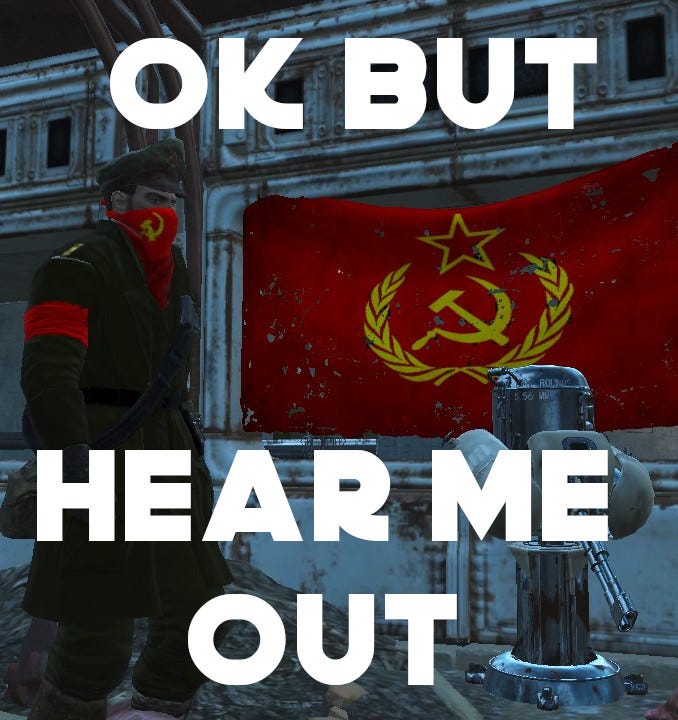
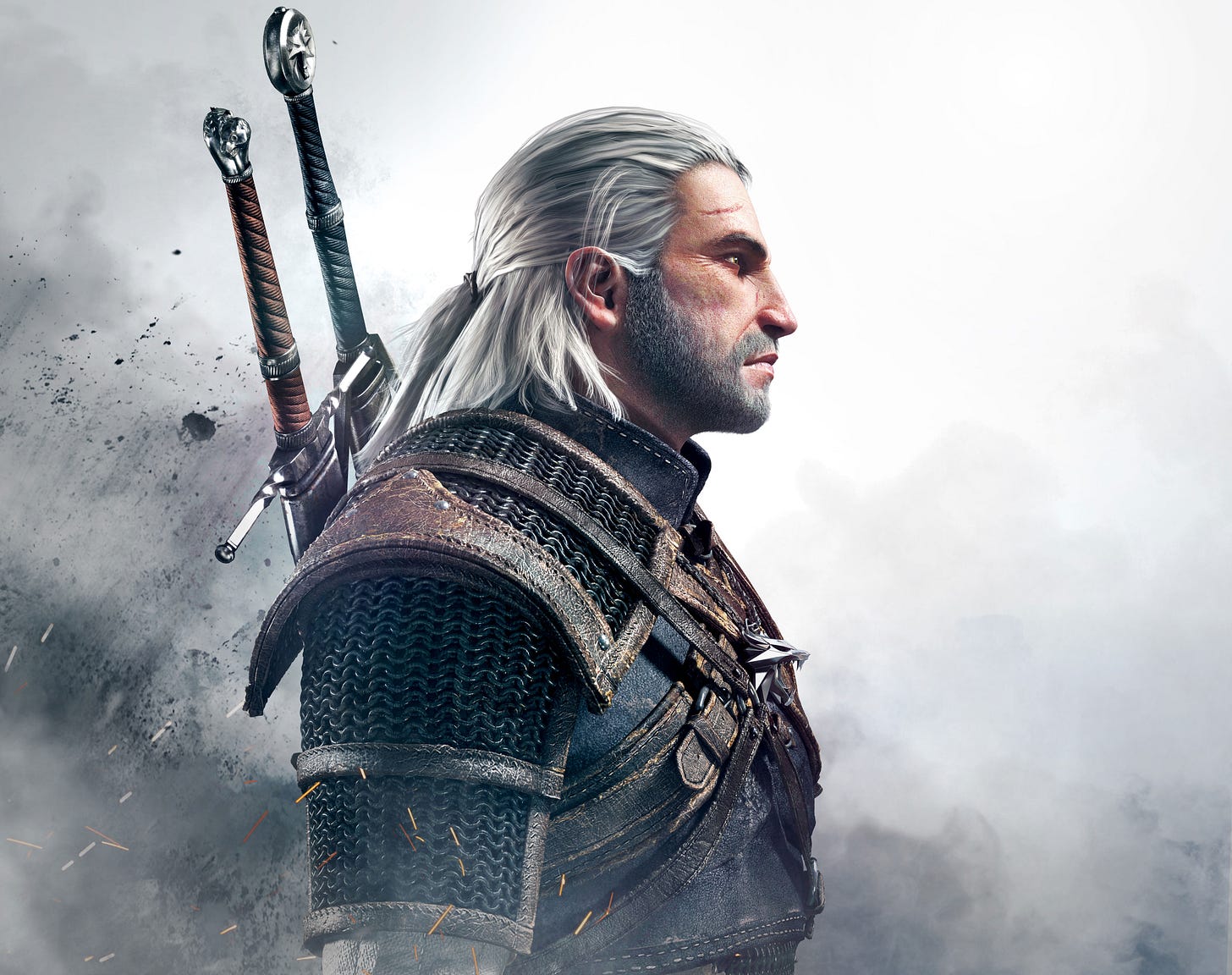
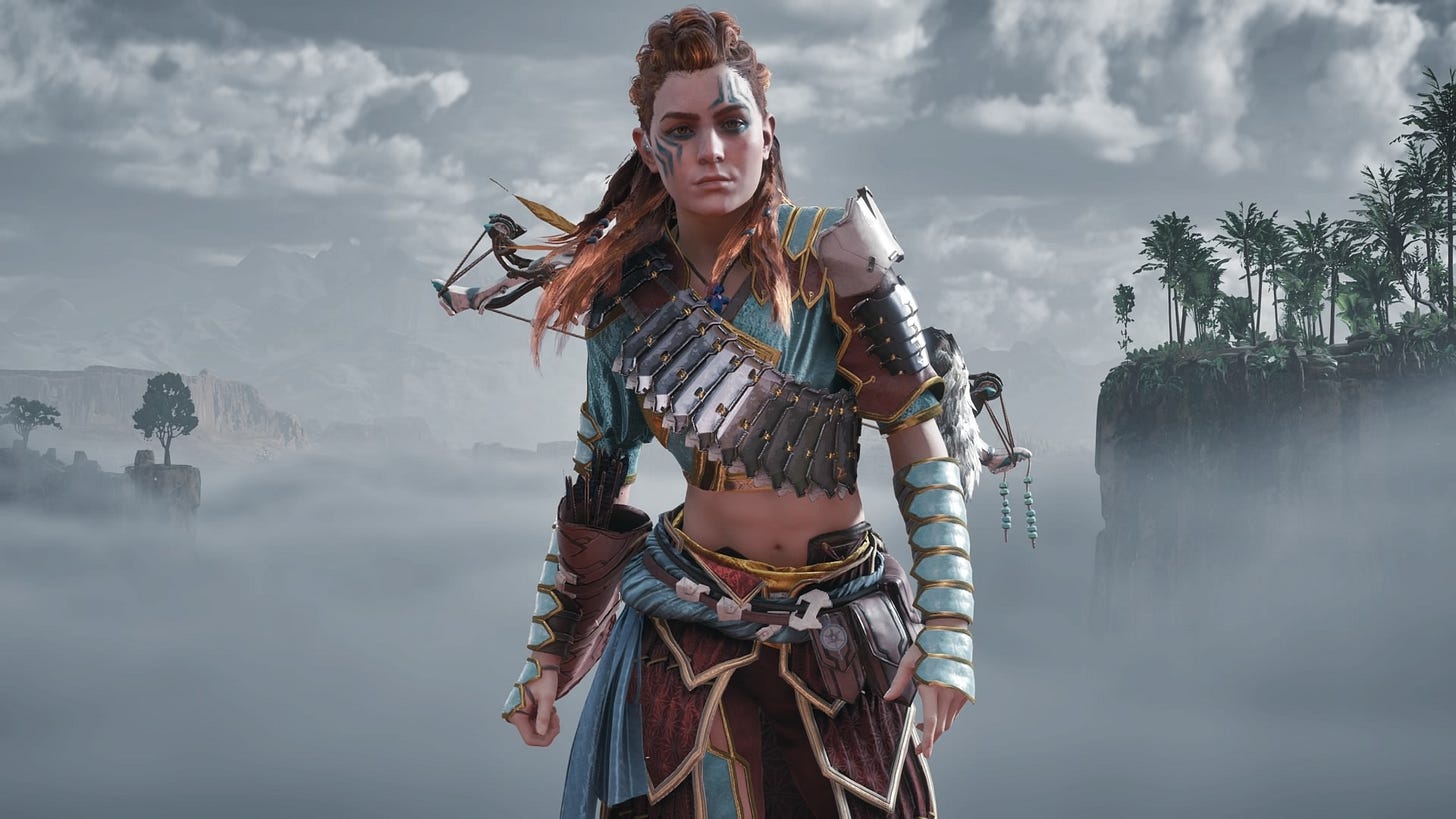
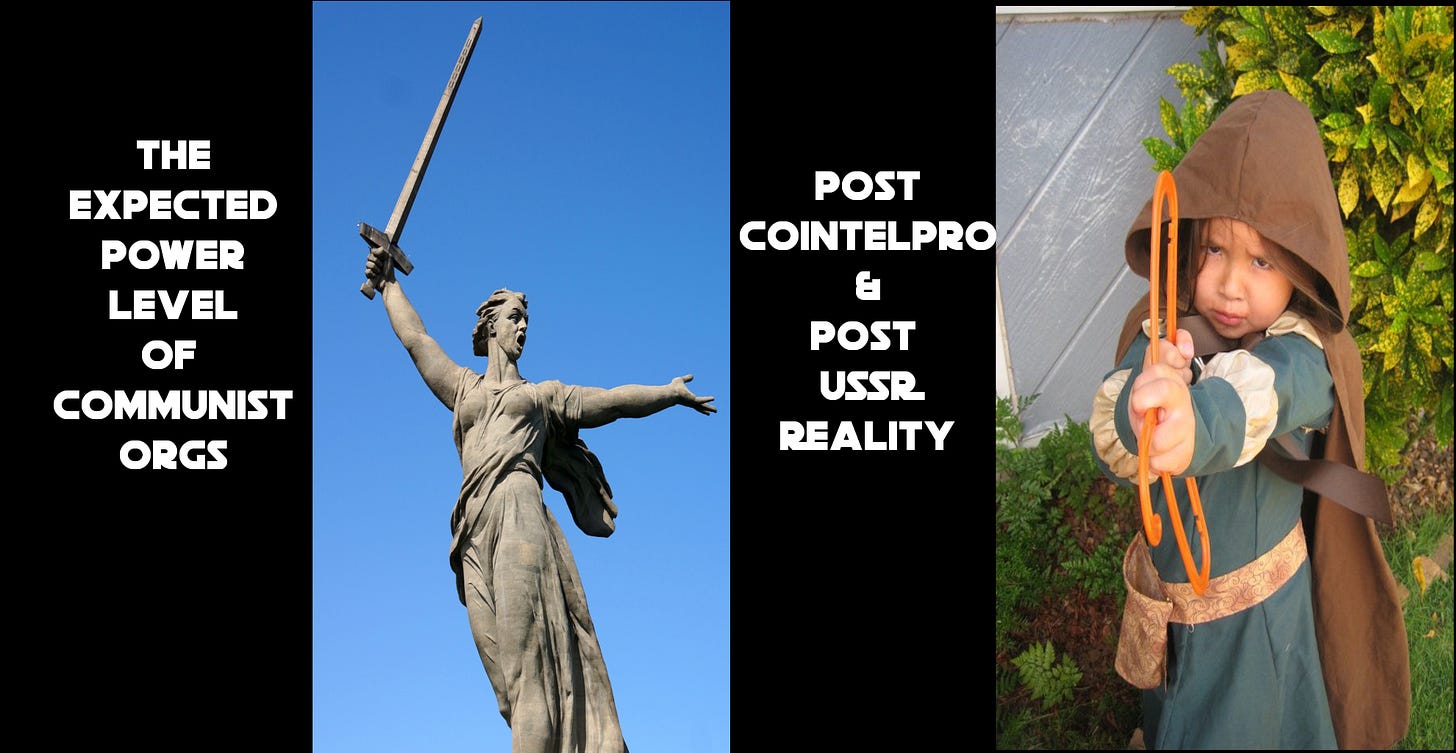
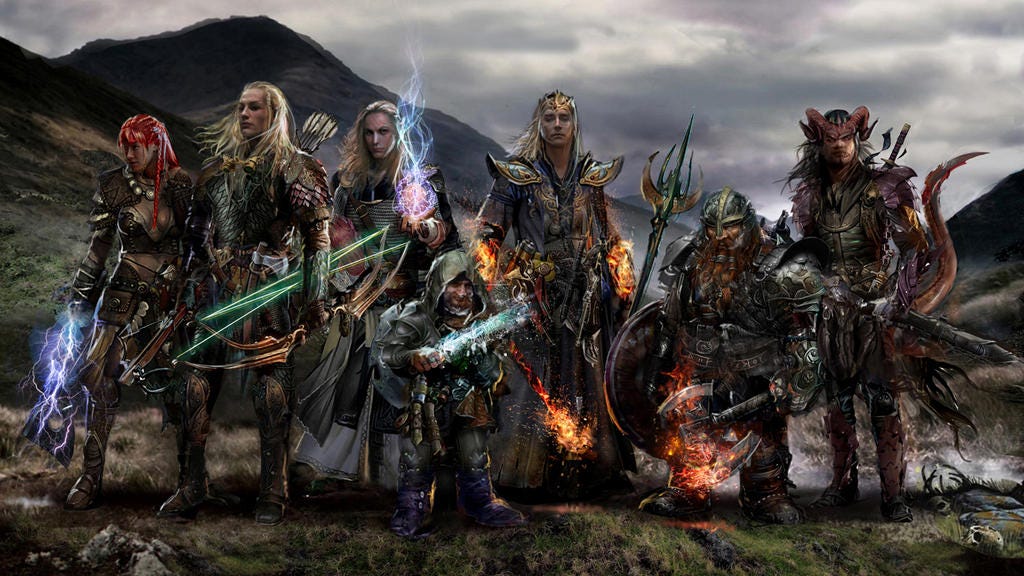

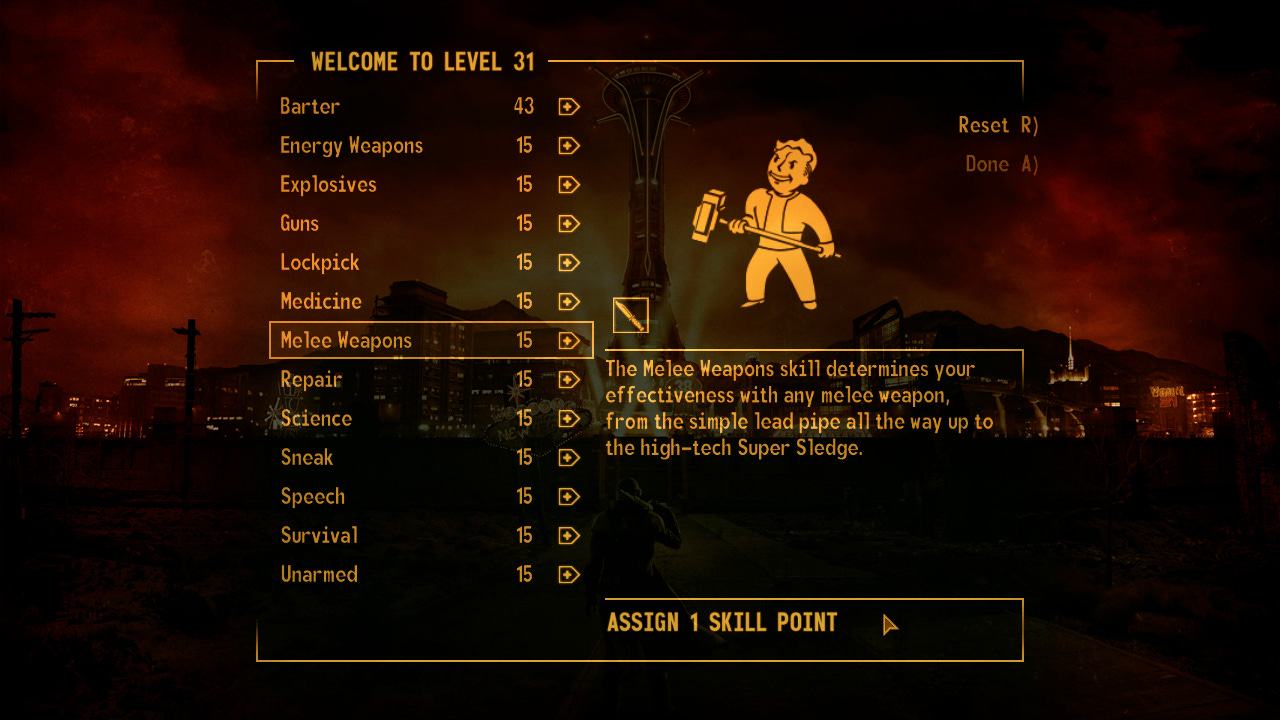
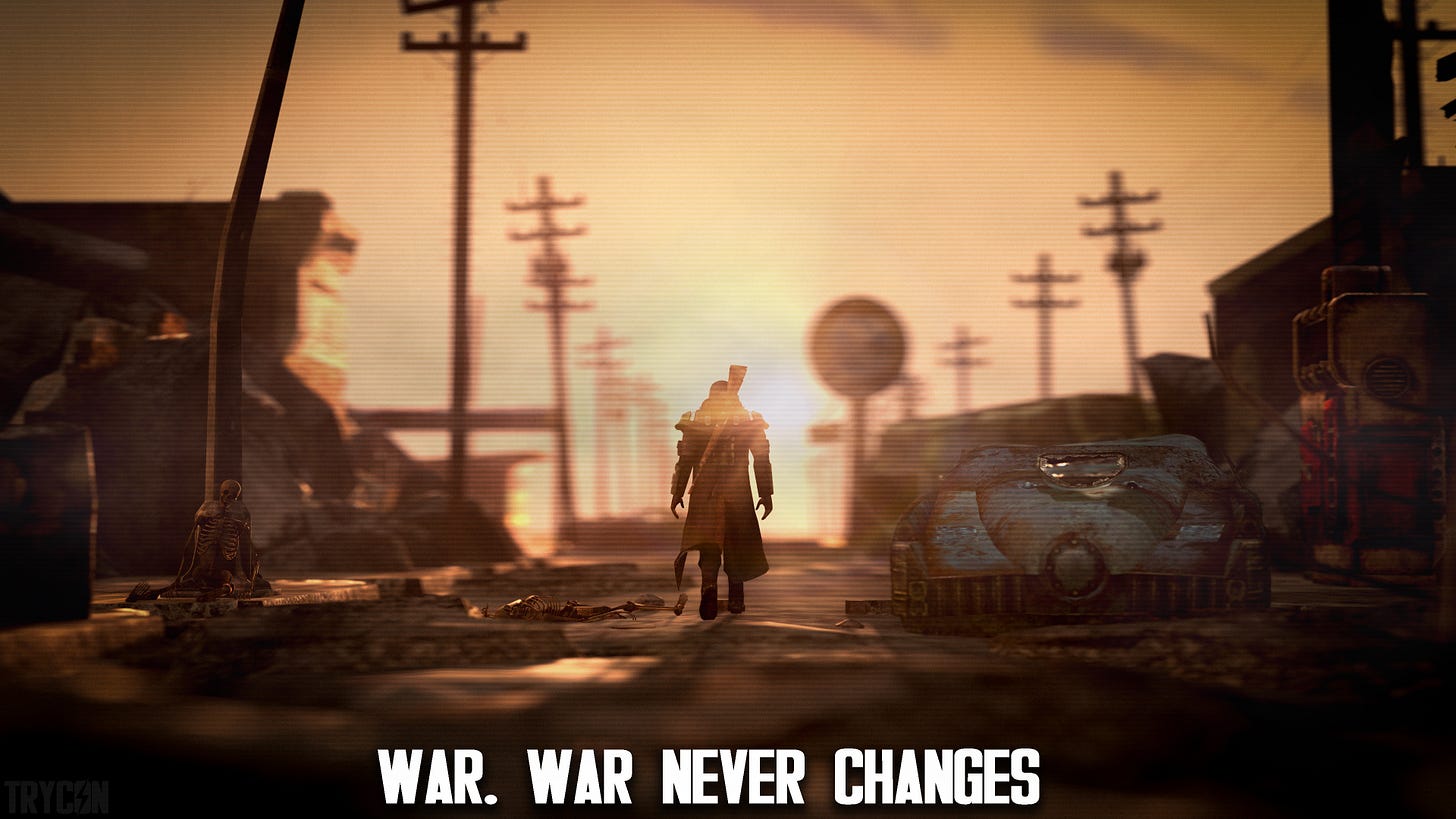
Really interesting read!